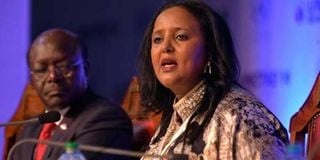UNCTAD talks deal give development top priority

Foreign Affairs CS Amina Mohamed (right) and UNCTAD Secretary General Mukhisa Kituyi during the closing ceremony of the 14th Session of the United Nations Conference on Trade and Development (UNCTAD14) at KICC in Nairobi on July 22, 2016. PHOTO | SALATON NJAU | NATION MEDIA GROUP
What you need to know:
- The provision on SDGs had been pushed by the African group of countries and other developing and least developed countries.
- UNCTAD will be charged with advising policies related to implementing development targets reached by the UN.
- The delegates also agreed that UNCTAD should mobilise additional financial resources for developing countries from "multiple sources.
Representatives of United Nations member states meeting in Nairobi endorsed two crucial documents on Friday evening that will provide a set of trade and development issues to be tackled in the next four years.
It means the United Nations Conference on Trade and Development (UNCTAD) will be charged with advising policies related to implementing development targets reached by the UN, monitoring adoption of a recent climate change agreement as well as other decisions relating to trade and the financial discipline of states.
The two papers — "Nairobi Azimio" and "Nairobi Maafikiano" — appeared like a compromise deal reached after days of haggling and the delegates' refusal to adjust positions.
For developing nations like Kenya, UNCTAD, the UN's principal agency on trade, will be charged with advising them on how to localise recent global targets adopted by member states.
"UNCTAD should contribute, through its three pillars of work, to the implementation, monitoring and review of the 2030 Agenda especially the relevant targets in areas of trade and development and interrelated areas of finance, technology and investment across the Sustainable Development Goals," the delegates declared in the Maafikiano document.
The Azimiodocument, derived from the Swahili word for "vision", will act as a declaration of guiding principles for UN members on issues of trade.
The Maafikiano paper, on the other hand, refers to a set of obligations for each member state and UNCTAD itself.
Delegates had generally agreed that the sustainable development goals (SDGs), a set of development targets agreed by the UN to be achieved by 2030, required great assistance from UNCTAD, especially for the poor nations.
TECHNOLOGY
These goals touch on improving the international system on trade as a way of alleviating poverty, supporting poor nations address environmental challenges as well as good national policies to ensure faster development.
While UNCTAD has traditionally been advising nations on policy areas to change in order to develop, the SDGs were only adopted last year and the agency had not been given a role to play.
The delegates also agreed that UNCTAD should mobilise additional financial resources for developing countries from "multiple sources."
The provision on SDGs had been pushed by the African group of countries and other developing and least developed countries. On Friday evening, the African group said it was happy about its adoption.
"We are pleased that this outcome will also address the capacities of members in policy analysis in trade, development, debt issues, and technology and sustainable development," said a statement read by a Namibian delegate on behalf of the African Group.
UNCTAD14 was meant to develop a consensus on actions needed to realise a number of global goals on development such as SDGs, the 21st Conference of the Parties to the UN Framework Convention on Climate Change reached last year in Paris, as well as the 10th WTO Conference held in Nairobi last year.
On Friday evening, Foreign Affairs Secretary Amina Mohamed, who also served as the president of the conference, said the documents represent a successful meeting.
"After vey many hours of negotiations, we were able, as members of UNCTAD, to adopt an outcome. We have two documents that we have adopted," said Ms Mohamed.
"It is a good day for Kenya, a good day for UNCTAD, a good day for the international community and a big win for multilateralism," she said.
(Editing by Beatrice Obwocha)





